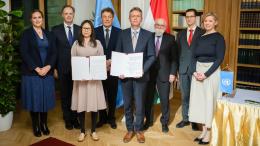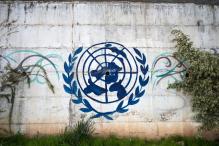On 9 June 2025, at UNU Headquarters in Tokyo, the Group of Latin America and the Caribbean Countries (GRULAC) in Japan partnered with the Hiroshima Organization for Global Peace (HOPe) to host the high-level seminar “The 80th Memorial of the Atomic Bombings and the Role of Latin America and the Caribbean as a Nuclear-Weapons-Free-Zone". The event brought together members of the diplomatic corps, Hiroshima Governor Hidehiko Yuzaki, Nagasaki Governor Kengo Oishi, and representatives from various ministries of the Government of Japan and the United Nations.
The seminar opened with remarks by H.E. Diego Dalton, Ambassador of El Salvador to Japan, and Ms. Eri Arfiya, Parliamentary Vice-Minister for Foreign Affairs of Japan. Both speakers underscored the enduring historical and diplomatic ties between Japan and the Latin American and Caribbean (LAC) region. Ms. Arfiya emphasized that “the threat of nuclear weapons is no longer an event of the distant past, but a real and present threat to us” — a sentiment echoed throughout the day.
A special commemorative session followed, featuring messages from Governors Hidehiko Yuzuki and Kengo Oishi, who emphasized the critical role of education in advancing peace and disarmament. Ms. Masako Wada, Assistant Secretary-General of Nihon Hidankyo, delivered a moving testimony based on her mother’s firsthand experience of the atomic bombing. Ms. Izumi Nakamitsu, UN High Representative for Disarmament Affairs, concluded the session by highlighting the alarming rise in global military spending, now at a record US$2.7 trillion, and called for diplomacy and dialogue instead of armament.
The first panel, moderated by Mr. Kunihiko Shimada, Principal Director of HOPe, focused on the role of Latin America and the Caribbean in nuclear disarmament. The panel comprised four Ambassadors to Japan, including H.E. Flavio Roberto Bonzanini (Brazil), H.E. Alfredo Labbé (Chile), H.E. Alejandro Solano (Costa Rica) and H.E. Enrique Ochoa (Mexico). The discussion highlighted the region’s leadership through the Treaty of Tlatelolco and the work of the Agency for the Prohibition of Nuclear Weapons in Latin America and the Caribbean. Amb. Labbé emphasized the importance of civil society in building political will, while Amb. Solano called for stronger global governance in light of emerging technologies. Amb. Ochoa reminded attendees that the majority of UN Member States (over 180) have committed to non-proliferation under the Treaty on the Non-Proliferation of Nuclear Weapons.
The second panel, moderated by Professor Shinobu Yume Yamaguchi, Director of UNU-IAS, explored comprehensive efforts, policies and education for peace, disarmament and non-proliferation. Panellists included Mr. Chitaru Shimizu, Director of the Arms Control and Disarmament Division of the Ministry of Foreign Affairs of Japan, H.E. Shorna-Kay Richards, Ambassador of Jamaica to Japan, Dr. Wakana Mukai, Associate Professor at Asia University, Mr. Hideo Asano, coordinator at the Japan Campaign to Abolish Nuclear Weapons, and Amb. Bonzanini. Discussions ranged from educational initiatives and intergenerational dialogue to the importance of inclusive, historically grounded disarmament education. Prof. Yamaguchi concluded by stressing the need for an “inclusive, human-centred approach” that incorporates civil society, youth and diverse perspectives into evidence-based policymaking.
The seminar concluded with remarks by H.E. Ricardo Rojas, Ambassador of Chile to Japan and Vice President Pro Tempore of GRULAC, who reaffirmed the shared values and enduring partnership between Japan and the LAC region in advancing global peace and disarmament.
As 2025 marks the 80th anniversary of both the atomic bombings and the founding of the United Nations, the seminar served as a powerful reminder of the progress made, and the urgent work that remains, in building a peaceful, nuclear weapons-free world.



